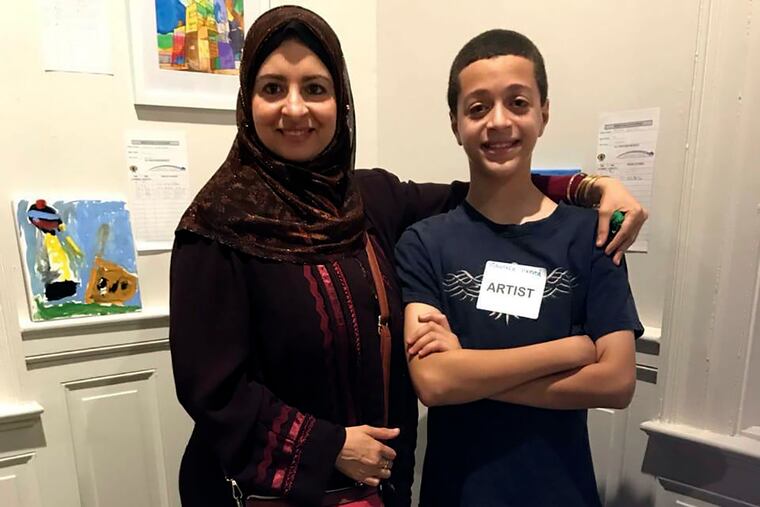A Lancaster mom was held 10 months in an Egyptian prison. Now she’s ‘safe and very happy’ to be home in Pennsylvania
Reem Desouky and her son remained in precautionary isolation but a friend who had chatted with her via video said Desouky was "safe and very happy to be home” in Pennsylvania after 10 months in an Egyptian prison.

CAIRO — Before his trip to Egypt last summer, Moustafa Hamed had likely expected to spend his final year in obscurity at his middle school in Lancaster County. Instead, the boy became an unexpected messenger in an international human rights case.
“America, please,” he said in a video released last fall, "I just need my mother.”
For months, his mother, Reem Desouky, had been imprisoned in Egypt without a trial for running a Facebook page critical of Egypt’s president. This week, she was released and returned to the United States. Days after flying from Egypt to Washington, Desouky and her son remained in precautionary isolation, and have declined to speak publicly about the ordeal.
But a friend who had spoken with her via video chat said Desouky was "safe and very happy to be home” in Pennsylvania. “She looked remarkably well,” the friend, Anita Pilkerton-Plumb, said on Wednesday.
Desouky’s release followed a campaign not just by local friends and supporters, but human rights advocates and U.S. officials.
“Her family and friends are ecstatic,” the Freedom Initiative, a nonprofit that had campaigned for her release, said in a statement.
A 47-year-old single mother and interpreter in Lancaster, Desouky had traveled to Egypt last July with her son to visit relatives. She was arrested on charges that included promoting a terrorist group on social media and publishing false news.
Since President Abdel Fattah al-Sisi came to power in 2013 in a military ouster, Egypt has increasingly leveled such charges against activists, journalists, and social media users who criticize the government, according to Amnesty International.
Egypt is a longtime U.S. ally. President Donald Trump has offered effusive praise for Sisi on numerous occasions, referring to him last year as his “favorite dictator.”
In the months after Desouky’s detention, at least 75 people and community groups had pressed lawmakers, the State Department and the Trump administration to intervene in her case.
Desouky was jailed at Qanater Women’s Prison outside Cairo, where 10 inmates launched a partial hunger strike in December to protest inhumane treatment. A fellow prisoner died in custody the same month, according to advocates.
Egypt’s overcrowded prisons drew new attention in recent weeks, with local activists calling for the release of prisoners to prevent coronavirus infections. Last month, U.S. Secretary of State Mike Pompeo raised concerns about American prisoners’ safety during the pandemic in a call to the Egyptian foreign minister.
But the reasons for those concerns were present before the virus. In January, another Egyptian American detained there, Mustafa Kassem, died in custody on a hunger strike after spending six years in a military prison without trial for allegedly joining a 2013 protest — an accusation Kassem had denied.
Vice President Mike Pence had previously raised Kassem’s case to Sisi, and his death sparked unusual criticism of Egypt from U.S. officials.
Pompeo called Kassem’s death “pointless and tragic.” Lawmakers called on Pompeo to reconsider $300 million in military aid to Egypt.
Kassem’s death put pressure on Egypt to release Americans, especially those seen as prisoners of conscience, said Tim Kaldas of the Tahrir Institute for Middle East Policy.
Meanwhile, Desouky’s release was a “low-cost win” for the Trump administration, Kaldas said, to defend its close ties to Egypt’s government and allay Congress’ concerns.
After Desouky’s release, the State Department said in a statement that it "has no higher priority than the safety and welfare of U.S. citizens overseas.”
U.S. Rep. Lloyd Smucker (R., Pa.), who represents Desouky’s district, noted in a Facebook post this week that "many people in our community advocated for her return and I know we are all happy that she is back safely.”
And Lancaster Stands Up, one of the groups that lobbied for her freedom, expressed thanks “to everyone who took the time to demand justice” on behalf of her and her family.
The Freedom Initiative said it hoped Desouky’s release would lead to more prisoner releases. Egyptian Americans Mohamed Amashah, a medical student, and Khaled Hassan, a limo driver, are two of a handful of Americans still imprisoned in Egypt. Desouky’s brother, Nour, also remains in prison, a Freedom Initiative representative told the Pittsburgh Post-Gazette. He was arrested during a visit to his incarcerated sister last summer.
Desouky’s plans for the future are unclear. But before boarding her flight home, she renounced her Egyptian citizenship.